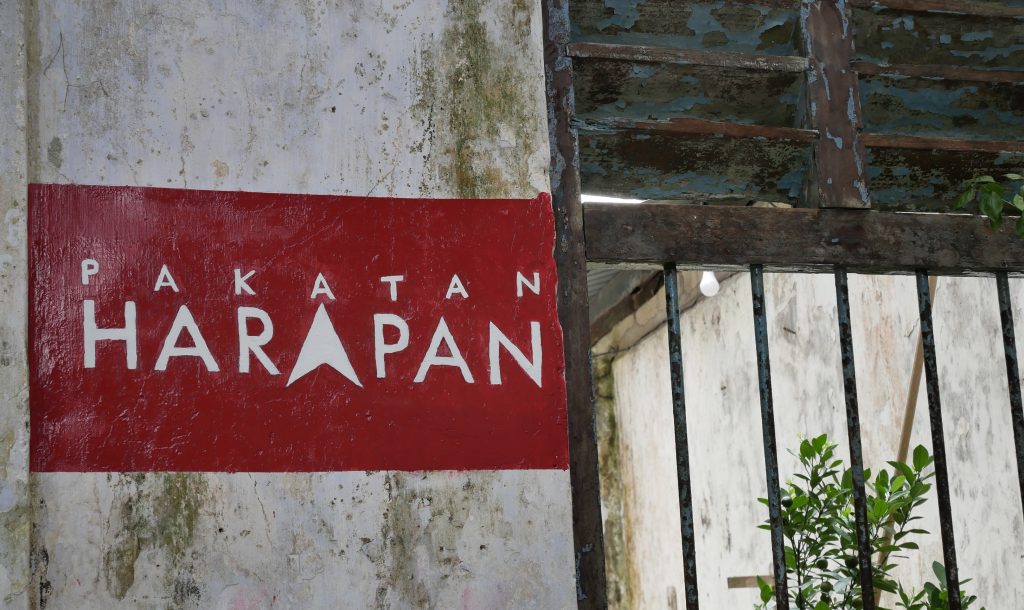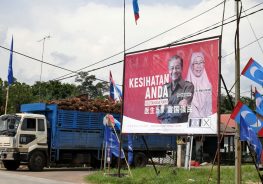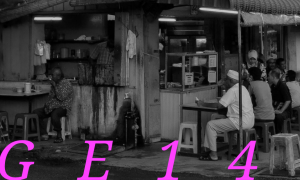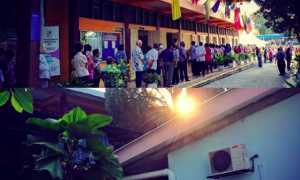The night of 9 May was a sleepless one in Malaysia. Long, hot polling station queues gave way to long, anxious waits for official counts and winners. Then, at around 3am, the Election Commission at last confirmed that the opposition Pakatan Harapan (PH, Alliance for Hope) coalition had bested the heretofore unshakeable Barisan Nasional (BN, National Front) at the federal level, and possibly in a majority of states.
Leadership has changed hands. Tun Dr Mahathir Mohamad, prime minister from 1982–2003, has been sworn in for another round. What is less certain is what we might expect now—not just in terms of transformation in Malaysia, but also for its similarly illiberal neighbours. Malaysia’s electoral upset offers us a useful opportunity to explain how electoral authoritarian regimes—polities whose elections are not expected to actually change the government—recede, and to consider what is unique to Malaysia and what might be more generic.
Overcoming the barriers
A transition such as Malaysia’s—via elections, without bloodshed, and accepted by the incumbent—after decades of single-party dominance and manipulation of the electoral playing field is exceedingly rare. What we’re looking to identify, then, are both proximate causes—that is, the final nudges that tipped the scales—and longer-term percolation. Savvy PH strategising and fevered wonkery, coupled with gumption (read: desperation?) also featured heavily. Four key game changers that helped in Malaysia are less germane to Malaysia’s neighbours; other factors are more widely relevant.
First and foremost, BN leader Najib Razak was woefully unpopular, including within his own party, despite his leadership being sustained by a clientelistic party structure. Even those supporters who doubt Najib’s culpability in the 1MDB saga and other scandals cannot help but notice his wealth and resistance to scrutiny—and the United Malays Nationalist Organisation’s (UMNO) hierarchical structure gave his “boys” a shared interest in fending off less-toxic intra-party challengers.
The BN has Najib to thank above all for its plunge in votes (even as he himself secured re-election in his constituency of Pekan, which has benefited palpably from his munificence in office). When UMNO’s tallest tree wavered he took much of the forest with him, toppling more popular BN leaders, from saplings like Shahril Hamdan to sturdy-rooted stalwarts like agriculture minister Ahmad Shabery Cheek and Johor’s Nur Jazlan Mohamed.
Meanwhile, UMNO’s BN partners, especially the big two of the Malaysian Chinese Association (MCA) and Malaysian Indian Congress (MIC), long since reduced to underbrush, are now mostly burned away. The BN, and specifically UMNO, faces a hard slog of regeneration and the challenge of training new growth in a way less susceptible to a leader who soaks up too much sun. As I remarked at New Mandala on election night, GE14 “[has] been merciless to BN—decimating [its] ranks, and not only the obvious suspects. Rebuilding will mean not just re-establishing a coalition, on whatever premise, but also figuring out who’s left”.
Second, Pakatan Harapan consolidated ranks around a common leadership. Dr Mahathir enjoys almost mythical stature among many in Malaysia, and his detractors have now had 15 years to lick their wounds and let the bad memories fade since he left office. Being able to identify such an individual is not essential, but it helped build confidence in Malaysia that someone with experience would be in charge, that that person would be Malay (which still matters in Malaysia), and that all the parties would cede their own claims to the premiership to this “outsider”.
Of course, the next step in Pakatan’s roadmap for governing may be tricky. We have yet to learn whether Mahathir’s aura extends to his once-deputy and finance minister and now imminent successor, Anwar Ibrahim, who is until now imprisoned on dubious sodomy charges. Anwar is also popular, but he’s no Dr M. Only once Mahathir passes the torch to a pardoned Anwar will we discover whether voters see also in Anwar what convinced them to trust in PH.
A third and related factor: one of the common refrains of studies of transitions from electoral authoritarianism is that the dominant party stays in power in large part by fragmenting, or impeding the unification of, the opposition. They achieve this by pushing opposition parties to the margins, complicating their efforts to organise and get their message out, and stirring up bogeys such as ethnic-group challenges or leaders’ foibles and feuds. Mahathir himself was a master of this art.
Opposition parties do suffer when disarray splits the protest vote. On the other hand, coordination requires each party’s giving up on those constituencies it cedes to its partners at election times, and the post-election divvying up of cabinet aspirations. Malaysia’s opposition parties have been building toward the current PH for decades, from the Socialist Front of the late 1960s, through Gagasan and Angkatan Perpaduan Ummah in the 1980s, to Barisan Alternatif, then Pakatan Rakyat, then today’s Pakatan Harapan over the course of elections since 1999. Notwithstanding the hard-fought stock of trust they’ve accrued, PAS still nearly spoiled the show this time by splitting opposition votes (though in the end, it seems to have taken more votes from the BN instead).
Fourth, today’s Pakatan Harapan rests on the legacy of the Bersih electoral reform movement of the past decade, the Reformasi movement of the late 1990s, and the human rights, dakwah, students’, and other activism since at least the 1960s-70s, through which Anwar Ibrahim got his start in politics. Long-time engagement within civil society has raised consciousness and trained generations of activists, yielding a substantial share of today’s PH politicians. It also keeps political interest and awareness piqued between elections, generates issues for parties to champion and data on which they might draw, and facilitates coordination among those parties, given symbiotic ties among parties and civil societal organisations.
To an important extent, key anti-BN impetuses have germinated in civil society, from demands for transparency and accountability, to Malaysia’s distinctive battles over the scope and character of Islamisation, to calls for restoration of states’ rights in Sabah and Sarawak, to still potent (and multivalent) demands regarding language and education. And elections-specific activism arguably built momentum for what initially seemed less-than-galvanising polls in 2018, given the rifts within both coalitions. Dramatically skewed constituency delineation helped reinvigorate support for Bersih and garner sympathy for PH, which Malaysians’ awe-inspiring get-out-the-vote (and get-the-votes-to-Malaysia) effort intensified.
Competitive authoritarian, but not too competitive
These factors help explain why the Malaysian opposition was able to overwhelm the institutional roadblocks to their victory. But is Malaysia’s belated reformasi likely to prove contagious? Could other countries in Southeast Asia with similarly illiberal structures follow suit?
There are elements to Malaysia’s experience that will lead dominant parties in the region to take heed, and lead opposition parties to take heart. Most importantly, a particular pattern of economic development over the years—and specifically an increase not just in costs of living, but also in inequality—may prove the Achilles heel for upwardly mobile Southeast Asian polities. For instance, anti-foreign-worker rhetoric in Malaysian campaign ceramah (speech-heavy election rallies) echoed sentiments already potent in Singapore, for the same key reasons: concerns that these newcomers are taking citizens’ jobs, driving down wage rates, and upstaging genuine locals.
Moreover, the cachet of cost-of-living messages in Malaysia—from commiseration, to promises of subsidies and tax relief, to the ever-present mockery of first lady Rosmah’s luxe handbags and gems—mimic similar complaints and concessions elsewhere. The same concerns that led economically vulnerable or worried voters to oust the BN have already cost Singapore’s People’s Action Party (PAP) support. Clearly, sentiment on the ground in Malaysia was not anti-capitalist; Mahathir’s developmentalist record (and surely his embrace of a pro-Malay economic slant) was central to his appeal. But these results suggest limits to public tolerance for the externalities of a development model premised on maximising top-line indicators and economic “flexibility”.
Furthermore, the new media landscape that helped Malaysia’s PH benefits opposition parties across the region equally well. With the shift from mainstream print and electronic media, to online news and opinion sites, to social media, and now to WhatsApp and similar platforms, opposition parties have mastered new ways of messaging. I would expect Southeast Asian opposition parties to innovate in many of the same ways as their Malaysian counterparts to capitalise on these tools, diminishing dominant parties’ advantage.
But we have yet to see the extent of transition now beginning in Malaysia; how far it goes matters for what lessons other polities draw. For instance, the task of extricating party from state is complicated not only by long-time habituation, but also by ownership patterns: the election may have dispossessed UMNO, the MCA, and MIC of their grip on government, but not of their holding companies, which still control major media and other key assets.
Moreover, machinations at the state level, especially in Sabah and Perak, cast some shadow over the new dawn. Part of the reform Malaysia might undertake, and not just for East Malaysia, is a reworking of the federal formula, particularly in terms of fiscal authority. That we not only have non-PH states, but also different inter-party alliances (at least at the time of writing) at the state versus federal level could discourage PH from taking too-quick action to empower states; the incentives it will face are much the same as those the BN has confronted all this while.
A politics of redemption in fractious times
How much change, beyond Najib's ousting, does a Mahathir-led coalition represent? Or does an emboldened, victorious Najib mean political rebirths are redundant?
In other words, it is not that the full package of Malaysian angst is likely to transmit wholesale to Southeast Asia, but that similar grievances might stimulate a similar response. Malaysia’s fight wasn’t won overnight; Mahathir matters about as much as the strongman under and against whose watch contemporary activism and opposition blossomed in decades past, as he does as the leader of this latest, decisive battle. And a lot remains to be done. The transition newly begun will meet no one’s preferences in full, including those seeking inspiration from the latest round of giant-slaying. Even so, in an era of democratic regression across this region and beyond, even dim glimmers of “progress” are all the more alluring.
 Facebook
Facebook  Twitter
Twitter  Soundcloud
Soundcloud  Youtube
Youtube  Rss
Rss 



